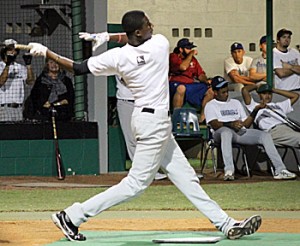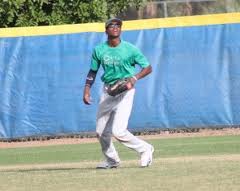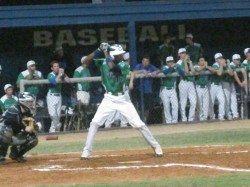Sunday Morning Chat Part I: Texas Rangers First-Round Pick Lewis Brinson
 The 2013 season has finally arrived, and I am kicking it off with an interview conducted with the Texas Rangers’ first-round draft pick Lewis Brinson. The former Coral Springs Colts center fielder has had quite the ride over the past year, moving from normal high school senior to first-round MLB draft pick. After covering the Colts star for two years, I noticed immediately upon arrival for our interview that Brinson had grown not only physically during his time in the Rangers organization but also mentally.
The 2013 season has finally arrived, and I am kicking it off with an interview conducted with the Texas Rangers’ first-round draft pick Lewis Brinson. The former Coral Springs Colts center fielder has had quite the ride over the past year, moving from normal high school senior to first-round MLB draft pick. After covering the Colts star for two years, I noticed immediately upon arrival for our interview that Brinson had grown not only physically during his time in the Rangers organization but also mentally.
Over the next few days, we will dive into a three-part interview, speaking with the Rangers first-round pick about his senior season in Part I, to the weeks leading up to the draft, and draft day, in Part II, and finally, his first season in pro ball in Part III.
Welcome to the 2013 season, and I hope you all enjoy!
HSBN: First off, I would like to say thank you for taking the time to sit down with us. Today we want to take viewers on a journey from your senior season all the way through being drafted in the first round, and then into your first year of pro ball.
LB: OK, Let’s do it.
HSBN: So lets start here. Last year at this time you were preparing for your senior season at Coral Springs. You guys played in the HSBN South Florida Preseason tournament, and right from the start, you were being followed and contacted by dozens of scouts. There was immense pressure on you to perform. How hard was it to deal with that pressure?
LB: At first it was pretty hard because I was just thinking about getting drafted and all these scouts coming to watch me at my games. And just knowing that those guys were there for me, it was kind of an overwhelming feeling. But I got used to it because I went through a whole summer of scouts just being everywhere I went. So, you know, I just got used to it.
HSBN: So you get into this season and it didn’t start like most expected it would offensively for you. With all the eyes on you, how much was the pressure building in your own head when you got off to a slow start?
LB: I’m not going to lie, it was building pretty fast. Like I said, I knew all those scouts were watching me and I knew they were judging me on my performance. I was trying to take the team to the State Championship and I was trying to lead everybody, you know, I was trying to do everything. But I couldn’t do everything and it overwhelmed me a little bit and got the best of me. That caused that slow start, constantly mentally thinking and getting inside my own head. But, it was just a phase that I went through and eventually got out of in mid-season.
HSBN: Skipping ahead for a second, we talked before the interview about of how coaches in high school hit on the fact that the scouts aren’t looking at the results, they’re looking at how you’re being coached, how you’re handling failure. Having had a year now of pro-ball behind you, how much do you see that that’s true now, of what the scouts are actually looking for.
LB: It’s absolutely true. Epecially in the lower levels of the minor leagues. They’re looking at how you’re developing and not what you’re doing on the field. Obviously they’re looking at results because your development produced results. But, it’s not a big deal to them. If you strike out five times in a game, they don’t care. They want to know how you struck out. They want to know how you’re dealing with that strike out, how you’re dealing with that bad game. So it doesn’t transfer into next week or the next series. Looking back, even in high school, they really didn’t care about my results because they knew what I could do on the field. What they want to know is, “Can he do it? Can he learn from his mistakes?”
HSBN: Did there ever come a time during last season when you were going through some of these mental stresses when doubt crept in and you thought, “Man I might be blowing my big chance here.”
LB: No, I never doubted that. I knew they knew what I could do on the field and I knew what I could do on the field. So I really had no doubt in my mind that everything was going to be fine. It was just at that moment, it was overwhelming and got to me a little bit. But in no way, shape, or form did I think I had no chance, I’m blowing my chance, this is going to be horrible. I never doubted anything.
HSBN: As the season wore on, the daily grind of having scouts out watching your every move had to take a mental toll like we talked about. Here you were a senior in high school, trying to do normal senior things. Going out to dinner with friends, grad night, prom, but on the other hand you had this huge weight hanging over you, the MLB draft. How conflicted were you through all of this? And were you able to actually enjoy any of those high school activities?
LB: I was, I was. But, I also knew where my priorities lied, and what I wanted to do. My main goal was to get drafted in the first round. It was to get to the big leagues. And I knew my goal, even in high school was, a regular high school kid should be thinking about all of that in the future, but I was thinking about it then, because I knew my ultimate goal and I wanted to reach that. I got to enjoy myself along the way. I went to high school parties. I went to dinners, like you said, I went to play a little b-ball with my friends, you know, so…I got to be a kid. I also knew, however, before I got to do all that, I had to get my work in. I would go to the cage or I would go work out or go speed training with a coach. I had to take care of my business first and then be a kid after.
 HSBN: A lot of players in high school don’t really understand that balance and I think that’s what a lot of coaches deal with. Some of the struggles coaches have is getting players to understand that you can still have the good times, but the work has to be put in as well. How were you able to mentally keep that balance at such a young age when most kids will, you know, skip out on the hitting or the running or something. How were you able to handle that?
HSBN: A lot of players in high school don’t really understand that balance and I think that’s what a lot of coaches deal with. Some of the struggles coaches have is getting players to understand that you can still have the good times, but the work has to be put in as well. How were you able to mentally keep that balance at such a young age when most kids will, you know, skip out on the hitting or the running or something. How were you able to handle that?
LB: This may sound kind of weird, but I watch a lot of TV. I watch a lot of big leaguers talk about how they work hard. How they maintain all their success. You have to put in the work first before you can play. I knew I wanted to be like those guys one day. I figured it would be better for me to start early at 17, 18 years-old to get my work done first and then go hang out with my friends and maybe catch up with them later. I also had a lot of mentors. My hitting coach kind of just took over as my mentor/trainer and he told me everything I needed to know and steered me in the right path.
HSBN: You’re talking about…
LB: Coach Gomez, Alvaro Gomez. He’s been working with me since I was about ten on hitting, speed training, doing everything. So, he took that role of mentor and telling me what I needed to do. He knew what my ultimate goal was, and he just stuck to helping me reach that. I know he’s very proud of me right now, and I knew he was proud of me then.
HSBN: You guys had three great years at Coral Springs. Regional Finals one year, Regional Semis the next and then Regional Quarters your senior year. Do you think that leadership and leading by example helped from a team aspect?
LB: Yes. I was named team captain my sophomore year so, I kind of had to be a leader early. And even when I was young, I liked to lead the team and be very vocal. Lead by example, lead by talking and motivating the guys. When I got to high school and I knew how good we were, and how good we could be, and we could win I tried to take advantage of that opportunity. I just lead by example most of the time and I tried to steer the guys on and off the field to not do anything stupid. Luckily we won district three times in a row and that’s because, I’m not saying because of my leadership, because the guys were so focused.
HSBN: At eighteen you were going through the mental stress usually reserved for adults. Who is the person, I guess you hit on it a little bit already, but who were some of the people you credit most with help keeping you grounded and assisting you mentally to get through the process?
LB: My mom, a lot. One hundred percent, my mom. She just steered me on the right path and she just grounded me, grounded me and made sure my head was on straight, raised me right, taught me everything I needed to know. She’s not a big baseball person, but again, she’s watched a lot of TV, she’s had parents who raised her right, so I mean she’s just, she get all the credit in keeping me grounded.
Coach Gomez, he’s um, my dad passed away when I was 11. Coach Gomez took that father role, without actually being at my house. I was with him as much as I was with my mom, training. He tried to teach me right from wrong, and how to be a man and stuff like that. Also my friends. My friends didn’t let me get a big head. They’re like, “Hey man, you’re still Lewis. You’re still our friend, you’re still one of us so don’t get a big head.” They kinda kept me grounded a little bit they would poke fun at me. They would poke little jokes at me, stuff like that, just to make sure I wasn’t getting a big head and not turn into one of those guys that thought they were larger than life in high school.
HSBN: I covered many of your games throughout your career and even last year with the spotlight on you seemed to have remained humble. You dropped bunts when you needed to, laid out for balls in the outfield. Seemed at times that your teammates meant more to you than all the outside excitement created about the draft. Why was that?
LB: Like I said, we had a goal then. I knew the draft was coming up, but I was worried about what was now because I couldn’t control the draft right then and there. So, I just took my responsibility to make sure we knew what the goal was and that was to win States. Whatever I had to do on the field, whatever I do off the field, whatever I had to do to help us win, that’s what I did, and obviously I’m a competitor. I love to win. I hate losing so, whatever got us to not lose, I was all in for. If that was laying down a bunt when there was a guy on third or a guy on second and we needed me to move him over, then that’s what I was doing. If we needed a base runner or taking away a base hit in the outfield, that’s what I was going to do. I couldn’t control anything else but what was happening out on the field.
 HSBN: So you season ends a little earlier than you guys expected with a loss to West Broward. Was that a bittersweet moment knowing your team goals are falling short, but also understanding you were one step closer to your dream?
HSBN: So you season ends a little earlier than you guys expected with a loss to West Broward. Was that a bittersweet moment knowing your team goals are falling short, but also understanding you were one step closer to your dream?
LB: It certainly was a bittersweet moment because again we were trying to win States. We were supposed to win States that year, but we couldn’t reach our goal. All the guys, most of us were seniors so it was going to be our last game of our high school career. But I also knew what coming next for me, and I knew all the other guys had their plans set up, so nobody was going to be left out of playing college ball. It was, like you said, a bittersweet kind of moment.
HSBN: Many players in your position would have sat out the All Star games and just waited for the draft. Why did you choose to go to Sebring and play, and did you second-guess that decision when you got hit in the eye warming up with Colton (Rogers)?
LB: I went because of my high school season. I didn’t really have the high school season I wanted to and I knew I could. And going, I knew there was going to be a workout before that game. And just to show my respect to all the people that recognize me as an All-Star; I was chosen a high school All Star out of every player in the state of Florida. I mean, it’s only right to go up there and show your face and compete.
It turned out to be the turning point in the draft. That workout I ran a 6.3 60. I had an amazing BP, and was outrageous in the field. That workout really benefited me in the draft.
I kind of regretted it afterwards, like you said, because I got hit in the eye, but my mom tells me everything happens for a reason. I was meant to go there and perform the way I did before and unfortunately I guess I was meant to get hit in the eye [laughing]. Looking back I’m glad I went up there.
HSBN: Hitting on that point a little bit more, coaches in high school are always telling their players you know, it only takes one look, it only takes a scout to see you one time and be impressed. They could have been to eight of your games, it’s only going to take one thing that stands out for them to pull the switch on you. What you just said goes to that point. Scouts followed you all year, and it only took one day to really turn their minds around. Is that a lesson you think for some of these young players?
LB: Like you said it only takes one look, one good day that you have that you’re at 100 percent that the scouts need to look at you. There’s no reason to think, “Oh man, I had a bad day.” Well they know what you can do. So you had a bad day, OK, well then you just have to come out and have a good day tomorrow.
Part II – The Draft Arrives – Coming Monday!









